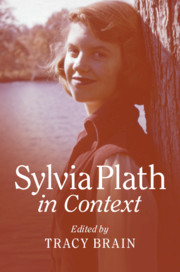Book contents
- Sylvia Plath in Context
- Sylvia Plath in Context
- Copyright page
- Contents
- Notes on Contributors
- Acknowledgements
- Chronology
- Abbreviations and Textual Note
- Key Archives
- Introduction
- Part I Literary Contexts
- Chapter 1 Plath and the American Poetry Scene
- Chapter 2 The Dominant Trends in British Poetry of the 1950s and Early 1960s
- Chapter 3 Plath and the Classics
- Chapter 4 Plath and the Radio Drama
- Chapter 5 ‘Sincerely Yours’: Plath and The New Yorker
- Part II Literary Technique and Influence
- Part III Cultural Contexts
- Part IV Sexual and Gender Contexts
- Part V Political and Religious Contexts
- Part VI Biographical Contexts
- Part VII Plath and Place
- Part VIII The Creative Afterlife
- Bibliography
- Index
Chapter 4 - Plath and the Radio Drama
from Part I - Literary Contexts
Published online by Cambridge University Press: 03 August 2019
- Sylvia Plath in Context
- Sylvia Plath in Context
- Copyright page
- Contents
- Notes on Contributors
- Acknowledgements
- Chronology
- Abbreviations and Textual Note
- Key Archives
- Introduction
- Part I Literary Contexts
- Chapter 1 Plath and the American Poetry Scene
- Chapter 2 The Dominant Trends in British Poetry of the 1950s and Early 1960s
- Chapter 3 Plath and the Classics
- Chapter 4 Plath and the Radio Drama
- Chapter 5 ‘Sincerely Yours’: Plath and The New Yorker
- Part II Literary Technique and Influence
- Part III Cultural Contexts
- Part IV Sexual and Gender Contexts
- Part V Political and Religious Contexts
- Part VI Biographical Contexts
- Part VII Plath and Place
- Part VIII The Creative Afterlife
- Bibliography
- Index
Summary
Andrew Walker writes from the premise that one of Plath’s most notable characteristics is her sense of the dramatic, her experimentation with multiple voices and personas. Walker establishes Plath’s long-held interest in radio drama growing up in America, and the impact of contemporary radio dramas and BBC’s the Third Programme on her work. Plath’s radio play, Three Women, is influenced by Dylan Thomas’s Under Milk Wood as well as Ted Hughes’s A Houseful of Women and The Wound, which appear during key phases in Plath’s poetic development. Walker accounts for a dramatic shift between Plath’s earlier and later work, and demonstrates the importance of an oft-overlooked, yet highly vital, poetic context.
Keywords
- Type
- Chapter
- Information
- Sylvia Plath in Context , pp. 42 - 50Publisher: Cambridge University PressPrint publication year: 2019

